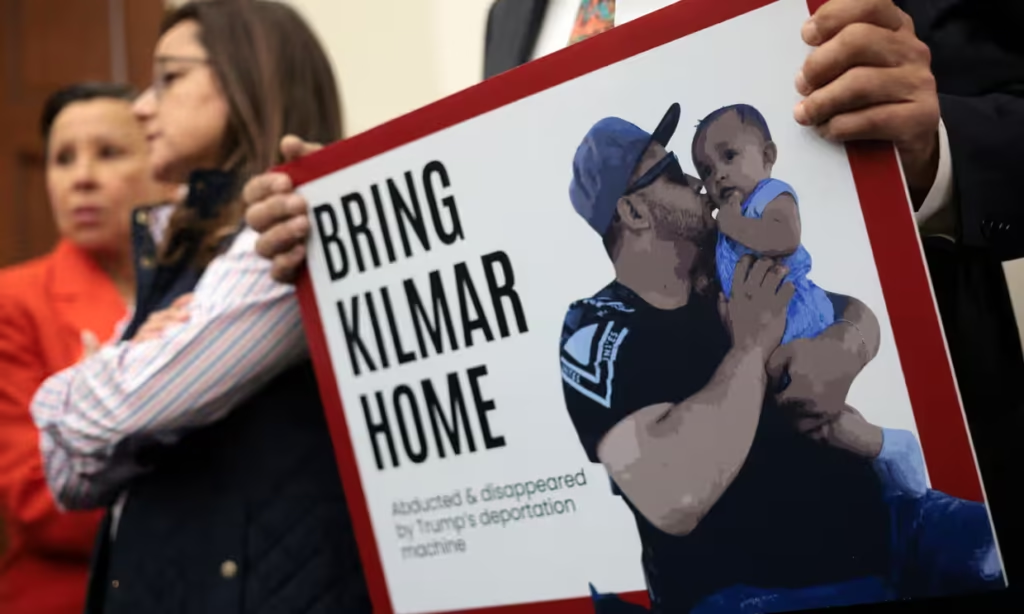
The wrongful deportation of Kilmar Abrego Garcia, a Maryland man sent back to El Salvador despite a court order barring his removal, has sparked a nationwide legal struggle. This case brings to light the troubling flaws within the U.S. immigration system and raises significant concerns about accountability and human rights.
Kilmar Abrego Garcia’s Story: Wrongfully Deported Despite Court Order
Kilmar Abrego Garcia, a father of three U.S.-born children, had lived in the United States for over 14 years. Despite being granted legal protection from deportation due to threats from gangs in El Salvador, the U.S. government mistakenly deported him. His case stands as a stark example of wrongful deportation and highlights serious flaws in the immigration system.
Abrego Garcia’s deportation was based on accusations of MS-13 gang affiliation, though he was never charged with any crime. His lawyers insist that these accusations are unfounded, and his removal was an error of justice that should never have occurred.
The Legal Struggle: Holding the U.S. Government Accountable
The legal battle over Abrego Garcia’s deportation has raised questions about the U.S. government’s accountability in deportation cases. Despite a Supreme Court ruling requiring the return of individuals wrongfully deported, the government has not yet facilitated his repatriation. U.S. District Judge Paula Xinis, who ordered Abrego Garcia’s return, has demanded daily updates on the government’s actions but has received little transparency.
This case is about much more than one man—it’s about ensuring that the U.S. immigration system functions in a fair and just manner. The fact that such a mistake could happen shows the need for more accurate and careful procedures when dealing with deportations.
Abrego Garcia’s Situation in El Salvador: A Dangerous and Uncertain Future
Currently held in El Salvador’s notorious Terrorism Confinement Center (CECOT), Abrego Garcia’s life remains in jeopardy. The U.S. government has not provided a clear path for his return, leaving his fate uncertain. Despite his continued labeling as an MS-13 member, there is no concrete evidence to support these claims, and his deportation was based on administrative error.
This facility, known for housing individuals accused of gang-related activities, is a dangerous place for anyone, let alone a man wrongfully labeled and deported without due process. Abrego Garcia’s case raises the question: how can the U.S. justify deportations when they put people in such peril?
Why This Case Matters for the U.S. Immigration System
Abrego Garcia’s wrongful deportation serves as a wake-up call for the U.S. immigration system. It underscores the need for greater transparency and accountability in deportation decisions. Immigrants, regardless of their status, must be treated with fairness and dignity, and due process should be upheld at all levels.
In this case, the errors made by the immigration system are not just procedural but have had real-life consequences. This situation shows the importance of adhering to judicial orders and ensuring that all deportation cases are handled with the highest standards of justice.
Holding the U.S. Government Accountable for Wrongful Deportations
This case is not just about one individual’s struggle—it’s about ensuring the integrity of the U.S. legal and immigration systems. The government must take responsibility for its errors and ensure that individuals like Abrego Garcia are not subjected to life-threatening circumstances due to bureaucratic mistakes.
As the legal team continues to fight for Abrego Garcia’s repatriation, this case has broader implications. It signals the need for an immigration process that is both accurate and just, one that protects individuals from being wrongfully removed from the country and subjected to harm abroad.
What Happens Next: The Fight for Justice Continues
As the legal battle for Kilmar Abrego Garcia’s return continues, the case has broader implications for the future of deportations and immigration justice. The U.S. government must act swiftly and decisively to correct this wrongful deportation and uphold its legal obligations.
In addition to fighting for Abrego Garcia’s repatriation, this case is a reminder that the U.S. must work to reform immigration practices to prevent further wrongful deportations. The integrity of the legal system must be maintained so that families do not face the same fate as Abrego Garcia’s family.